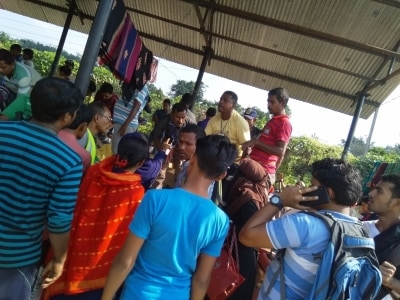As India and Bangladesh focus on increasing connectivity, the two countries are also looking at ways to ensure that a large part of the current quantum of informal trade is formalised by facilitating cross-border movement. Currently Prime Minister Narendra Modi is in Dhaka to participate in the golden jubilee celebrations of Bangladesh’s independence.
Political analyst Sandip Ghose pointed out that the value of informal trade between the two countries could be as much or even more than the formal trade between the two.
“Bangladesh is growing at a fast pace, so there is lesser worry on the illegal infiltration front,” BJP’s national spokesperson, Gopal Agarwal, said. “However, we may not be in a position to make the borders more porous at this point,” he added.
At present four border haats are operational– two in Tripura and two in Meghalaya.
The over 4000 km long international border along India and Bangladesh stretches along Assam, Meghalaya, Tripura, and Mizoram in the north eastern region besides West Bengal.
“India is now serious about connectivity especially with the northeast and its neighbouring countries. In this scenario, India must open up borders further which in turn would boost trade,” Ghose said, adding that legalising labour mobility is the need of the hour.
“Once the labour movement is legalised, the problem of infiltration is taken care of, we need to think of a strategy like that,” Ghose said.
A CUTS International report too highlighted the need to redraw the contours guiding bilateral trade. At present, only those people who reside within 5 km along the borders are allowed to participate in these border haats—micro markets, set up to cater to the local residents.
The report also said that the 5 km restriction must be removed to allow traders and customers from far off areas also to participate. The report also said that the list of items that are allowed to be traded needs to be extended based on the demand supply gap. “One of the reasons for informal trade is the demand-supply gap for the commodities traded through the informal channels. As per government norms live fish, poultry products and agricultural seeds are not allowed to be traded through the border haats. However, this is not able to restrict trade in these commodities – rather it is resulting in trade through informal channels so far as these products are concerned,” the report said.
“A large part of the informal trade that happens between both the countries through Assam and Tripura can be formalised in a structured and a time-bound manner. Further, Assam can benefit from the economic growth of Bangladesh and can be a worthy supplier for industries in Bangladesh, particularly the textiles and silk industry. Also, areas like fisheries and agriculture could get a newer and a more stable market,” Joyeeta Bhattacharjee, senior fellow wrote in an article published by the Observer Research Foundation.




















